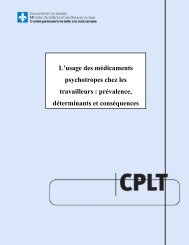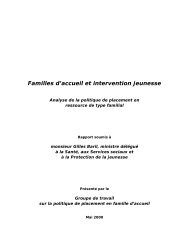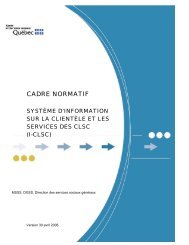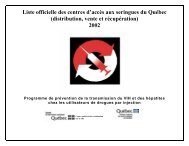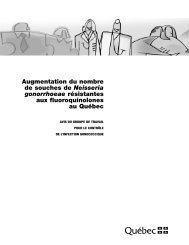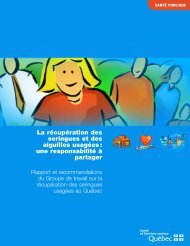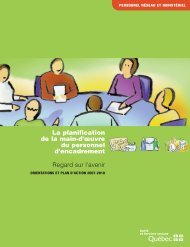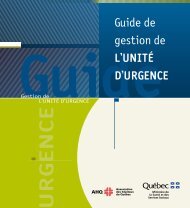De l'innovation au changement - Gouvernement du Québec
De l'innovation au changement - Gouvernement du Québec
De l'innovation au changement - Gouvernement du Québec
Create successful ePaper yourself
Turn your PDF publications into a flip-book with our unique Google optimized e-Paper software.
Projet 31<br />
Setup of an Integrated System for Persons Suffering from Major Psychistric Problems<br />
Ssystème intégré, troubles ment<strong>au</strong>x sévères et retard mental, région <strong>du</strong> Nunavik<br />
1. CLIENTÈLE VISÉE Personnes souffrant de troubles sévères et persistants de santé mentale et les personnes avec un retard mental provenant des 14 villages<br />
situés le long de la côte de la Baie d’Hudson et de la côte de la Baie d’Ungava, <strong>au</strong> Nunavik; 2 000 km de territoire.<br />
2. BUDGET ALLOUÉ 488 238$ $<br />
Type de projet : intervention, évaluation (pilote)<br />
3. CONTEXTE D’ÉMERGENCE<br />
3.1 Pourquoi le <strong>changement</strong> The Nunavik population is dispersed among 14 villages located along the Hudson Bay and Ungava Bay coasts. The fact that there are no<br />
road links between the communities and the rest of the province (the only means of transportation is by air) leads to problems involving<br />
population dispersion and vast distances. The geographic context is therefore an important element in any organization’s operating costs,<br />
first bec<strong>au</strong>se each community, no matter the size of its population, has to be provided with basic services and, second, bec<strong>au</strong>se transfers<br />
to Montréal are required for certain health and social services. In spite of efforts to patriate specialized medical services to the North, the<br />
region annually transfers some 1 600 patients with escorts to Montréal. Transfers cost the region an average of $2 500 each, for a total of<br />
about $4 million per year.<br />
In 1994-1995, the Hudson coast had 18 serious mental health cases. With the ambulatory trend, transferring patients suffering from<br />
chronic problems to Montréal has become more and more difficult, aggravating the situation in the communities. Apart from the two health<br />
centres and some foster families ensuring relief, no other resource is available for this clientele. Moreover, the problems are amplified <strong>du</strong>e<br />
to the lack of resources in both intermediate residences and family and community support. Thus, families and communities are forced to<br />
await the patients’ total disorientation before receiving access to the sole resource available: the hospital. .<br />
3.2 Principales caractéristiques This pilot project aimed at providing persons with major psychiatric problems a structured, therapeutic milieu for acquiring life and work<br />
skills, helping them restore and consolidate personal and social skills, helping them reintegrate into the community through remunerated or<br />
volunteer work, providing relief for families and the community and providing telephone support 24 hours per day, seven days per week for<br />
indivi<strong>du</strong>als, families and the community.<br />
The centre provides 24-hour-a-day residential care and external services to a<strong>du</strong>lts who have been diagnosed with major psychiatric<br />
problems or intellectual impairment. The personnel members work with the clients and their families to help identify, understand and<br />
resolve their problems. Services provided at the centre include vocational training, behaviour management and training in the activities of<br />
daily living. Enhancing clients’ knowledge and practice of traditional skills is a priority.<br />
The reintegration centre is committed to a bio-psycho-social model of intervention that takes into account all aspects of the client’s life.<br />
Short-term and long-term placement: The residential program gives clients an opportunity to learn personal care, household management,<br />
money management, shopping and meal preparation as well as a chance to participate in leisure activities that provide an opening for<br />
enhancement of social skills.<br />
Objectif général <strong>du</strong> projet : assurer l’accessibilité et la continuité des soins tout en favorisant l'intégration des personnes dans leur<br />
commun<strong>au</strong>té<br />
153





